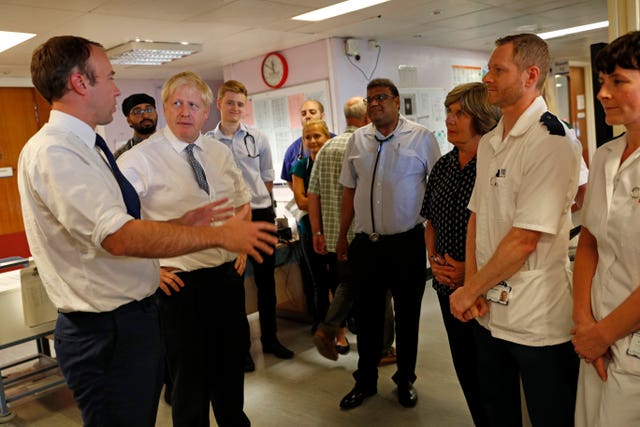Labour has accused Boris Johnson of misleading voters over a promised £1.8bn cash injection for the National Health Service.
The prime minister said his latest high-profile announcement from the Government represented genuine “new money” for the service.
However, shadow health secretary Jon Ashworth said ministers were now simply releasing funds which had previously been blocked.
Downing Street insisted the money was new, with £850m going to 20 hospital upgrades, while £1bn was for capital spending.

However, the PM’s official spokesperson acknowledged some of the money would “allow existing upgrades to proceed”.
Ashworth said: “Boris Johnson has misled the public and our NHS staff. You cannot trust a word he says and his claims are unravelling.
“It is now clear this is not new money, but funds already earmarked for hospitals which ministers previously blocked.
“With 4.4 million patients waiting for operations and over 20,000 cancer patients waiting longer for treatment, it is a disgrace that Johnson is trying to treat people like fools.”
Speaking during a visit to the Pilgrim Hospital in Boston, Lincolnshire – one of the hospitals set to benefit from the increase – Johnson was adamant that the £1.8bn was new money.
“It’s part of a national programme that the NHS asked for and I want to stress this is new money,” he said.
“I said 10 days ago on the steps of Downing Street, that we would be upgrading 20 hospitals – 20 new hospital upgrades around the country – and this is it.”

At a briefing for political journalists at Westminster, Johnson’s spokesperson said: “This is new money.
“It includes £850 million in new funding for 20 hospital upgrades and £1 billion of new funding for NHS capital spending, allowing existing upgrades to proceed and tackling the most urgent infrastructure projects.”
Sally Warren, director of King’s Fund health thinktank, acknowledged that the announcement would give the NHS “new spending power”.
However, she said that it could also be seen as simply reversing cuts which had been made last year.
“At one level yes it is new money – if the Treasury today were not providing this money, NHS trusts would not be able to spend this £1.8 billion,” she told the BBC.
“But another view is that actually – particularly the £1 billion that’s been announced today – is really reversing cuts that trusts were asked to make this year.”
Nigel Edwards, chief executive of the Nuffield Trust thinktank, said the money was only a fraction of what was needed to deliver the improvements the service needed.
“This is a welcome down payment on the staggering £6 billion needed to clear the backlog of NHS maintenance but it will only be a fraction of what it would cost to really upgrade 20 hospitals,” he said.
“Nobody should expect shiny new hospitals in their towns any time soon.”
Chris Hopson, chief executive of NHS Providers – the body which negotiates on behalf of NHS trusts with the Government – said “both the Government and the health think tanks are correct”.
He added: “As a result of this morning’s announcement, frontline NHS providers will be able to spend £1 billion in 2019-20 on backlog maintenance and other capital spending that they weren’t able to spend last week.
“The Department of Health and Social Care’s capital spending limit will be increased accordingly and that will count against overall government capital spending limits. By our definition that is genuine, new, extra money.
“At the same time, the health think tanks are correct that some of the extra 2019/20 capital expenditure enabled by this announcement will be funded through cash surpluses currently sitting on provider balance sheets.
“That spending can legitimately be described as money that trusts already had, but were told they couldn’t spend and are now able to spend.”









